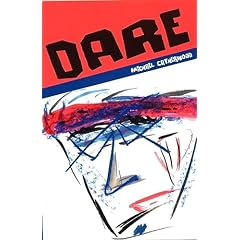

Michael Catherwood’s Dare
Catherwood, Michael. Dare. Backwaters Press, 2006. (84 pages)
The pieces in Dare, Michael Catherwood’s recently published first book of poems, are heavy with the weight of living. Family hobos are silent and creepy, bathroom schemers populate cocktail lounges, and the gravelly roads threaten to swallow-up anyone who walks them. Poem after poem begins with an image that proclaims the severity of human existence.
“In Adulthood” begins optimistically, but it’s a set-up:
under bright skies we think we know
but only fall like children on black ice,
all of us dusted between sleep and sentience.
Falling children? It’s a brave piece that opens with such a shocking image. Catherwood makes this claim here: becoming adult is failing at being a child. As we mature, we learn about the perils of hidden ice, we learn about the changing unfamiliar sky.
Many of the poems in this book confront the shifting responsibilities of adulthood and the consequences of failing to successfully accept those responsibilities, while at the same time painting a complete picture of a man unable to acknowledge his own identity. Through memories we learn about the speaker’s vagabond grandfather, and there is the general impression of multiple truck stop visits through the swollen belly of America. But the speaker never finds a home of his own, either.
Reading Dare as a complete piece is a heavy undertaking. Dare is an emotional purge, a self-immolation. When I was finished I sympathized with the dazed subjects of the photographs in “Cheese,” the book’s closing poem:
The past is oil, slick business for the angry.
The sky shifts. The camera pops.
The innocent shuffle out of focus, and away.
So I was beaten. And blinded.
Catherwood writes often about the dark and dusty train yards of the American plains. With an astute eye he draws out the surprising detail that makes his poems admirable. He shocks in “Incline: Interstate 29:”
The truck rests on its side
like a broken horse begging for a bullet
—and he shocks us even more in “Structure: 3201 Leavenworth”:
Because last year’s crew mowed a drunk
passed out in the weeds
I have to survey the yard
with a corn knife,
Catherwood layers each poem with evocative and darkly passionate pin pricks.
The title poem carries the epigraph “Boy Found Dead on Sandhills Railroad Trestle,” and recounts the story of a childhood dare gone wrong. But maybe, the poem states, it’s love that pushes the boy’s head down. It’s difficult to find justification for that claim, that love forces tragedy, that love makes a boy replace a penny on the train track with his head. But that image is characteristic of the rest of the book. We are appalled by the thought, but drawn to the despair. Rubberneckers in our cars at the site of an accident, we look despite everything that begs us not to look.
Dare as a collection makes a similar statement. We’ll never understand the motivations behind the actions of others, or ourselves, or the world at large, and most times the best we can do is observe it and take note. Making it through is the greatest dare of all.
Catherwood succeeds in doing what he sets-out to do. His images are powerful, his language laserbeam cutting. It might be uncomfortable to spend time with, but Dare’s honesty and insight make the time worthwhile.
Jason Kahler received his MA in creative writing from Eastern Michigan University. His writing has appeared in Switchback, Current, and Seneca Review. He teaches at Baker College in Allen Park, Michigan, where he lives with his wife and three-year-old triplets.
Boxcar Poetry Review - ISSN 1931-1761